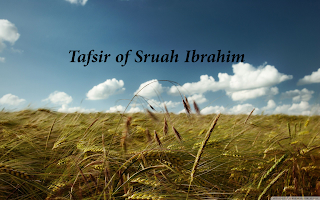Have you not seen those who exchanged Allah’s bounty for disbelief and caused their people to dwell in the abode of destruction? [Q 14: 28]
It is Hell, wherein they will suffer burning. What a terrible abode! [Q 14: 29]
They have made equals to Allah to lead others astray from His path. Say, ‘Enjoy! Indeed, your final abode will be the Fire.’ [Q 14:30]
Say to My slaves who have believed that they should perform the prayer and spend from what We have given them, secretly and openly, before a day comes on which there will be no bartering nor friendship. [Q 14:31]
Allah is the One who created the heavens and the earth and caused water to descend from the sky thereby producing fruits for your sustenance. He subjugated for you the ships, sailing through the sea by His command and He subjugated for you the rivers. [Q 14:32]
He subjugated for you the sun and the moon, moving constantly, and subjugated for you the night and the day. [Q 14: 33]
He has given you all that you asked Him. If you tried to count Allah’s blessings, you could not enumerate them. Indeed, man is very unjust, very ungrateful. [Q 14: 34]
Relationship with the Previous Part
The previous part describes how the conditions of the believers and the disbelievers will in the Hereafter. Then this part describes how the conditions of the disbelievers of Mecca were. Allah made the disbelievers dwell in Mecca, an area that He sanctified, granted them abundant sustenance, and sent them Messenger Muhammad, who belonged to them. However, they were ungrateful and disbelieved in Allah and His Messenger Muhammad.
Tafsir
Have you not seen those who exchanged Allah’s bounty for disbelief and caused their people to dwell in the abode of destruction? [Q 14: 28]
The interrogation in the ayah is for criticism and condemnation.
Exchange refers to misplace something, namely, meeting Allah’s bounty with ingratitude.
Have you not seen those who exchanged Allah’s bounty on them for disbelief in His Messenger Muhammad? Allah sent Messenger Muhammad to bring people out of the darknesses of disbelief into the light of belief in the Oneness of Allah, Exalted be He. However, the disbelievers have chosen loss by rejecting to believe in Allah and His Messenger. Consequently, they caused their people to dwell in the abode of destruction, namely, Hell.
Sound intellect and logic necessitate that one should thank the bestower of the blessings. However, the people of Mecca were ungrateful for Allah’s bounty on them. Allah made them dwell close to His sacred House in Mecca and honored them by sending Messenger Muhammad to guide them to Islam, the path leading to His pleasures. Moreover, Allah made the people of Mecca wealthy, enjoying comfortable life. Instead of thanking Allah, Exalted be He, for His blessings, they were ungrateful. They disbelieved in Messenger Muhammad. Thus, they caused their followers to dwell in Hell in the Hereafter, as they died as disbelievers in the Oneness of Allah.
Abdul-Allah bin Abbas, may Allah be pleased with him, said that this ayah referred to the people of Mecca. However, the meaning of the ayah is general and includes all disbelievers in every place and era. Allah sent Messenger Muhammad as a mercy for humanity. He is a blessing that Allah granted people. Whoever accepts this blessing and thanks Allah for it will enter Paradise. On the other hand, whoever refuses to follow the right path that Messenger Muhammad called to follow, which is a rejection of Allah’s blessing, and becomes ungrateful for it will enter Hell [Tafsir ibn Kathir, Tafsir al-Quran al-Azym].
It is Hell, wherein they will suffer burning. What a terrible abode! [Q 14: 29]
The abode of destruction that the disbelievers will cause their followers to dwell is Hell. They will remain in Hell forever, suffering its lasting and severe burning and torment. What a terrible abode Hell is!
They have made equals to Allah to lead others astray from His path. Say, ‘Enjoy! Indeed, your final abode will be the Fire.’ [Q 14:30]
Allah, Exalted be He, mentions an example of the abominable deeds of the disbelievers, and their invalid creed.
The disbelievers did not only denied Allah’s blessings on them, and would cause their followers to dwell Hell, but they also made equals to Allah by worshipping other gods besides Him. They did so to lead people astray from the path of Allah, Islam.
[Say – O Messenger, ‘Enjoy!’] This is a threat to the disbelievers. O Messenger! Say to the disbelievers enjoy the worldly life. It is fleeting and impermanent.
[Your final abode will be Hellfire.] O disbelievers! Hell will be your destination. You will go there soon. In Hell, you will suffer the evil consequences of your disobedience and disbelief in Allah and His Messenger.
Say to My slaves who have believed that they should perform the prayer and spend from what We have given them, secretly and openly, before a day comes on which there will be no bartering nor friendship. [Q 14:31]
Allah commands His Messenger Muhammad to keep on inviting the believers to constantly perform righteous deeds.
O Messenger! Tell My believing slaves that they should always perform the prayers at their appointed times with sincerity and humility. Tell them also that they should spend from the sustenance that Allah has granted them secretly and openly for His sake at all times. They should spend secretly if there is a reasonable reason for doing so. On the other hand, they should spend openly if a certain benefit will be realized by doing so.
Spending from wealth is mentioned in this ayah refers to obligatory and voluntary spending. The ayah mentions that spending should be done from the sustenance that Allah has granted His slaves to remind people that Allah is the real owner of their wealth. Thus, they should acknowledge His blessings on them and thank Him by spending from their wealth on charitable causes.
Allah, Exalted be He, says ‘My slaves.’ This indicates honor to the sincere slaves of Allah, who believe in Him and His Messenger Muhammad.
[…before a day comes on which there will be no bartering nor friendship.]
O Messenger! Tell My slaves that they should constantly perform the prayer, and spend from the sustenance that Allah has granted them before the Day of Judgment comes suddenly. On that day, bartering will be useless, and intercession of friends to one another will be unbeneficial. The only thing that will be beneficial and acceptable on that day is sincere righteous deeds that the believer did in the worldly life for Allah’s sake.
The ayah urges the believers to always perform the prayer and spend from their wealth for the sake of Allah by reminding them of the day on which no deed can be done, no opportunity to return to the worldly life to perform righteous deeds, no compensation will be acceptable, and no friends can benefit one another.
Then the ayat mention proofs, denoting the existence of Allah, His Oneness, His Omniscience, and His Omnipotence.
Allah is the One who created the heavens and the earth and caused water to descend from the sky thereby producing fruits for your sustenance. He subjugated for you the ships, sailing through the sea by His command and He subjugated for you the rivers. [Q 14:32]
[Allah is the One who created the heavens and the earth.] Allah, Exalted be He, created the heaven and beautified it with stars, and created the earth, and made it flat and stable so that people can live on it comfortably.
[He caused water to descend from the sky thereby producing fruits for your sustenance.]
Allah caused rain to descend from the sky thereby different kinds of fruits grow. Man eats this sustenance and enjoys its taste and beauty.
[He subjugated for you the ships, sailing through the sea by His command and subjugated for you the rivers.]
Allah subjugated the ships for man. He inspired him how to make them, and showed him how to use them. These ships sail through the sea by the command and permission of Allah. Furthermore, Allah subjugated the rivers for man so that he can benefit from them. He gets drinking water from the rivers and supplies his cattle and plant with water from the rivers.
He subjugated for you the sun and the moon, moving constantly, and subjugated for you the night and the day. [Q 14: 33]
Allah subjugated the sun and the moon for man. The sun and the moon constantly move in their orbits without any disturbance. Moreover, Allah subjugated the night and day for man, alternating one after the other so that man can benefit from each one of them to manage his life. The night is for sleep and comfort and the day is for seeking sustenance.
He has given you all that you asked Him. If you tried to count Allah’s blessings, you could not enumerate them. Indeed, man is very unjust, very ungrateful. [Q 14: 34]
[He has given you all that you asked Him.] Allah has given His slaves countless blessings as well as He has given them whatever blessing they ask Him according to His will and wisdom, which they do not know.
[If you tried to count Allah’s blessings, you could not enumerate them.]
O people! If you tried to count the blessings of Allah on you, you could not enumerate them, and you could not thank Him for them unless He helps you to do so.
Talaq bin Habib said, ‘Indeed, the right of Allah is so great that man cannot fulfill. Indeed, the blessings of Allah are numerous that man cannot count them. Thus, repent in the morning, and repent in the evening [Tafsir at-Tabari, Jama al-Bayan]’.
[Indeed, man is very unjust, very ungrateful.]
Indeed, man is very unjust. He exchanges the blessings of Allah on him for ingratitude instead of thanking Allah for them, and worshipping Him sincerely. Indeed, man is very ungrateful as he worships other gods besides Allah, who has granted him countless blessings and commanded him to worship Him alone.
Learned Lessons From Surah Ibrahim Ayah: 28-34
• The disbelievers deserve to enter the abode of destruction, Hell, because they deny the blessings of Allah on them instead of thanking Him, worship other gods besides Allah instead of worshipping Him alone, and lead people astray from the path of Allah, Islam.
• Hell, wherein the disbelievers will suffer severe torment, is the evilest dwelling.
• Allah, Exalted be He, has commanded the believers to constantly perform the prayer, spend, secretly and openly, from the sustenance that He has granted them for His sake before the coming of the Day of Judgment. On that day, neither ransom nor friendship will avail man. Only righteous deeds based on sincere worship of Allah will avail him.
• The universe has countless proofs denoting the existence, Oneness, Omniscience, and Omnipotence of Allah, Exalted be He.
• Some of the proofs of the existence and ability of Allah are the creation of the heavens and the earth, causing rain to descend from the sky, making ships sail through the sea by the command and permission of Allah, and subjugating the sun, the moon, the night, and the day for man.
• The blessings of Allah on man are countless. Man will fail if he tried to count them.
• Man must thank Allah for His blessings by obeying Him and using Allah’s blessings in a manner that pleases Him.
• The disbeliever is very unjust and very ungrateful, as he worships other gods besides Allah, and denies the blessings of Allah on him.





